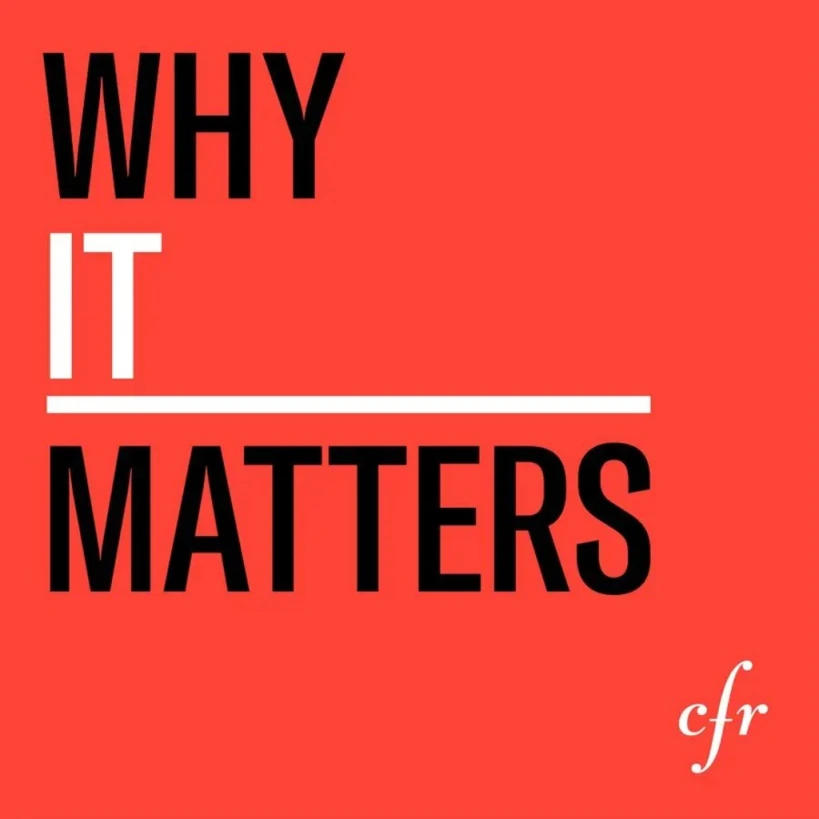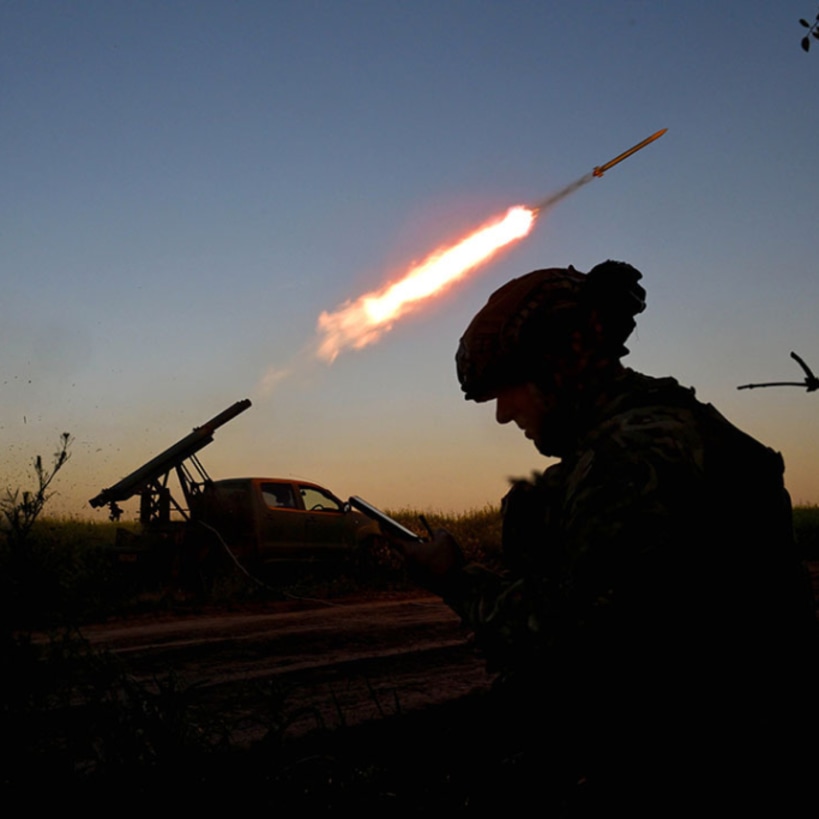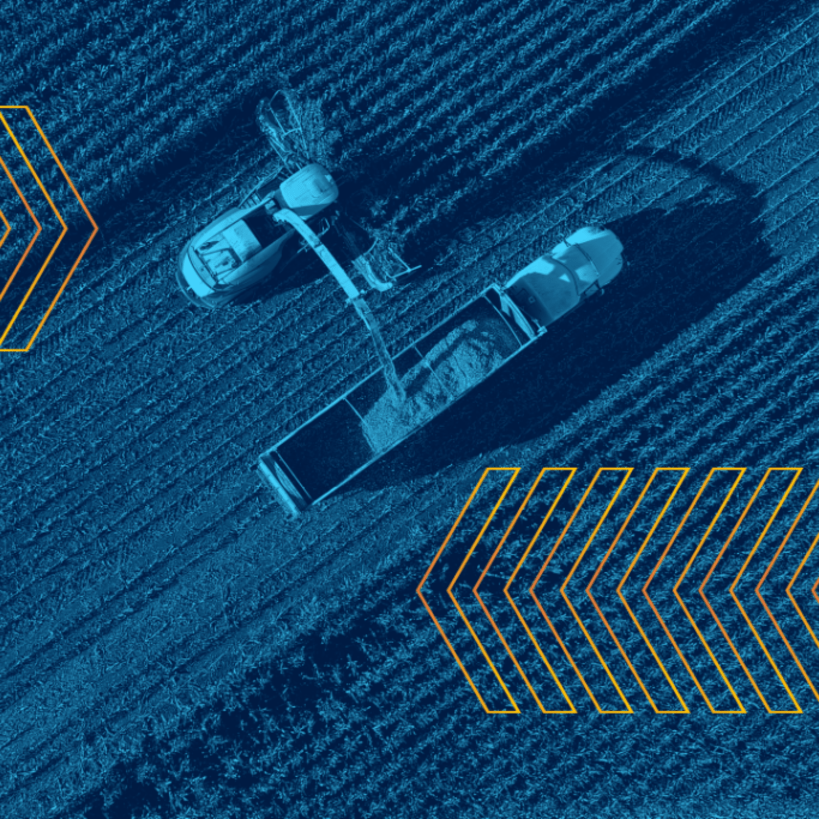The World Is Watching Us
The killing of George Floyd, the anti-racism protest movement that followed, and the Donald J. Trump administration’s response have shaken the United States and captivated the world. Why It Matters speaks with two foreign correspondents to understand how the protests are being understood abroad.
Published
Host
- Gabrielle SierraDirector, Podcasting
Guests
- Chika OduahIndependent Multimedia Journalist
- Keith B. RichburgDirector, Journalism and Media Studies Centre, University of Hong Kong
Supervising Producer
- Asher RossLead Content Strategist
Audio Producer and Sound Designer
- Markus ZakariaAudio Producer & Sound Designer
Associate Podcast Producer
- Rafaela Siewert
Senior Producer
- Jeremy SherlickDirector of Video
Show Notes
Protests against systemic racism and police brutality have emerged in most major U.S. cities since the killing of George Floyd. The reverberations have spread across the world, but the reactions have not all been the same. Some have taken the opportunity to accuse the United States of moral hypocrisy, while others have embraced the opportunity to reexamine racism in their own countries. Solidarity protests have emerged in dozens of countries, such as Australia, France, and Kenya. It is unclear what type of reform will follow the U.S. protests, but it is undeniable that the world is watching what happens closely. Why It Matters speaks with two foreign correspondents to understand how the protests are being interpreted abroad.
From CFR
“Why African Nations Support U.S. Anti-Racism Protesters,” Jendayi E. Frazer
“Black Lives Matter—for Social Justice, and for America’s Global Role,” Stewart M. Patrick
“Trump’s Threat to Use the Military Against Protesters: What to Know,” Jonathan Masters
“How America’s Credibility Gap Hurts the Defense of Rights Abroad,” David J. Scheffer
“Photos: How George Floyd’s Death Sparked Protests Worldwide,” Lindsay Maizland
“Is Hong Kong Still Autonomous? What to Know About China’s New Laws,” Jerome A. Cohen
“Democracy in Hong Kong,” Eleanor Albert
Read More
“Images From a Worldwide Protest Movement,” Atlantic
“Yes, Lafayette Square Is Tahrir Square,” Foreign Policy
“As Protests Engulf the United States, China Revels in the Unrest,” New York Times
Watch or Listen
“What the George Floyd protests say about America,” Guardian
“Why people around the world are protesting the death of George Floyd,” Washington Post
Transcript
NowThis: 0:00-0:03 I can’t breathe. I can’t breathe.
https://www.youtube.com/watch?v=pID8qf6kGaQ&feature=youtu.beNew York Times: 0:00-0:06 Hands up, don’t shoot. Hands up, don’t shoot.
https://www.youtube.com/watch?v=tRmqEbP0G6I&feature=youtu.beRuptly: 0:28-0:37 Di Su Nombre,(George Floyd), Di Su Nombre, (George Floyd), Di Su Nombre,(George Floyd), Di Su Nombre
https://www.youtube.com/watch?v=Bpio2o1qHQ8&feature=youtu.be&t=29TODAY: 0:00-0:04 Overnight, Chaos in Minneapolis.
https://www.youtube.com/watch?v=yjpOX6Gy4FY&feature=youtu.be&has_verified=1&bpctr=1592337708Sky News 0:05-0:07 The biggest gathering that London has seen in weeks.
https://www.youtube.com/watch?v=4OwYGHOZnqo&feature=youtu.beFace The Nation: 0:30-0:37 From Berlin, to Seoul, South Korea, to Rio in Brazil, to Sydney, Australia.
https://www.youtube.com/watch?v=VA1dsfqvHkE&feature=youtu.be&t=43CBS: 0:42-0:46 Everywhere, George Floyd’s death has struck a mighty chord.
https://www.youtube.com/watch?v=XBgxupJQKns&feature=youtu.be
Chika ODUAH: So they’re always looking at America with rose colored glasses or whatever. But now, you know, I think that that view of America as a beacon of hope and democracy has been tinted and they are somewhat disillusioned by this current administration and they’re making comments to reflect their thoughts.
Keith RICHBURG: After the murder of George Floyd on television, and it was a murder, I had people walking up to me or I had students knocking on my door saying, “Oh my God, what’s happening in America? What’s going on? Can you explain it to us?” And, and I really couldn’t explain it. What, what do you say? I mean, how do you explain something like that?
Why It Matters spends a lot of time discussing how things that happen around the world affect us at home. But today we are going to flip that around. Because, the killing of George Floyd, the protests against police brutality and systemic racism, and the administration’s response, are not only unfolding here, in the United States. The world is listening, too. And depending on where you are, the echoes can sound different.
To better understand how this is playing out, we turned to two American journalists who have spent their careers reporting abroad. We asked them to give us their own thoughts and experiences, and to describe what America looks like, right now, through the eyes of those who are watching from afar. They told us about two places; Africa, and Hong Kong.
I’m Gabrielle Sierra, and this is Why It Matters. Today, diplomacy starts at home.
RICHBURG: This kind of reminds me how, throughout history, you know, and I’ve studied history and political science, throughout history, America’s goal and mission, of trying to go around to promote democracy and human rights around the world has constantly been undercut by how they treat minorities and particularly African Americans at home.
I’m Keith Richburg, I’m currently the Director of the Journalism and Media Studies Center at The University of Hong Kong, but I spent most of my career, about 34 years as a reporter, and correspondent for The Washington Post.
During the Cold War, the old Soviet Union propagandists used to take great pleasure in pointing out how Black Americans were treated in the American South during the Jim Crow era. You know, the propagandists during the Vietnam War would like to point out how American Blacks were being treated. You know, we were not able to really, as strongly as we wanted to, stand up against the Apartheid regime in South Africa in its early days, because the Apartheid regime in South Africa was in many ways modeled on the Jim Crow segregation laws of the American South. So I think throughout history, America’s stated mission and goal of promoting democracy and human rights, and Roosevelt’s four freedoms around the world have constantly been undercut by enemies who were willing to point out the hypocrisy of America’s positions and America’s promotion of human rights, by saying, “Before you come lecture us, why don’t you deal with your own problems at home?”.
ODUAH: It’s quite painful for me because I do have both experiences, you know, living in America, born in Nigeria, I do have both views and I’ve experienced this racism in America.
My name is Chika Oduah. I am an independent multimedia journalist. I am based in West Africa, and I cover the entire continent for various international media outlets.
The killing of George Floyd was very jarring. It was a wake up. It was a brutal awakening for people who actually don’t quite believe racism is as real as African Americans say that it is. You’ve still got people who don’t believe it’s that strong, who believe that it’s from the past, that there have been many, moves towards overcoming, you know, some people still believe that America is a post racial society. So for this incident, this killing of George Floyd it’s like, “Oh, actually, it’s still there, you know, and we saw it on TV. We saw this guy breathing for his life for nearly nine minutes.” So in that aspect, it is a rude awakening. It’s really provoking some nations to look inward, you know, look at their own injustice. For example, in France, you know, people there were calling for an end to the choke hold that some police officers use. And so they’re having debates on how to handle people.
RICHBURG: You know, I was overseas, when the Rodney King episode happened in Los Angeles, 1992, and you started to see riots going on. I was in Nairobi, Kenya, and while the U.S. was criticizing the Kenyan government for using the police to violently break up pro-democracy demonstrations in Kenya, they could easily point back to the U.S. and say, “Well, why don’t you deal with your own situation before you come and lecture us.” I have to say, as a Black reporter overseas, I’ve constantly heard it said to me by officials, whether they’d be from China, or in the Middle East, or elsewhere, saying, “Well, hold on. You’re Black. So you understand what I’m talking about. You know how bad the U.S. is. You know how bad the U.S. government is.” As if I’m supposed to kind of be able to take sides with, you know, an oppressive government because I’m supposed to know that the U.S. government is also oppressive.
Gabrielle SIERRA: So, what’s it like being an American in Hong Kong right now?
RICHBURG: Well, it’s, it’s really interesting. You’ve got a lot of things going on here at the same time. We’ve been dealing with one year since the massive protests started, since the now pulled Extradition Bill, and it’s been a year of, of turmoil really. I mean, last year, 2019, almost every weekend was a different protest or demonstration in the streets. Some of them, incredibly violent with police on both sides, police violence, protester violence, vandalism. Uh, it kind of culminated in, November 11th when the city just kind of exploded.
South China Morning Post: 0:04-0:07 Hong Kong Protest.
https://www.youtube.com/watch?v=WpfQnEOlkz0&feature=youtu.be&t=6&has_verified=1
RICHBURG: The universities were taken over by students who were battling police, and now I’m watching the U.S. and while Hong Kong is, uh, relatively quiet, the U.S. seems to have this protest movement that’s kind of only growing, and becoming more sustained, so it’s kind of interesting now to watch, you know, the U.S. going through what we went through. And the other major thing that’s happened is the Chinese government in Beijing has announced it’s going to impose a new national security law on Hong Kong. This is the thing that President Trump said is really kind of stripping away Hong Kong’s autonomy. But from the Chinese perspective, it gives the police, and the Chinese government new tools to be able to control, the unrest that we’ve been seeing. So, I think that you, you can basically call it a crackdown coming from the north.
SIERRA: So you brought up President Trump. A lot of people are saying that the way the Trump administration reacted to anti-racism protests, following the killing of George Floyd has undercut our moral authority abroad. Do you feel like this is the case?
RICHBURG: I think it’s definitely the case that the, the Trump administration’s reaction to the protests, and the actual protests themselves have totally undercut America’s kind of moral standing, and ability to chastise others abroad for how they deal with demonstrators. You know, here in Hong Kong, we saw very violent police reaction to peaceful protests that started in June 9th of 2019. Uh, the police used tear gas, they’ve used rubber bullets. They’ve used live bullets in a few occasions. I’ve seen them beating, you know, handcuffed, and perfectly subdued protestors, who were not resisting arrest, real incidents of police brutality. I’ve seen them covering up their badges, and their identifying numbers with black tape, so we, there’s no way you could actually report who was doing what.
SIERRA: Wow.
RICHBURG: All of this has been captured on video, and the administration through the state department, and through the U.S. consulate here has consistently condemned these kind of, violent action against peaceful protestors, but now we see police in the U.S. doing the same things, it’s really kind of like watching an echo going on now, so yeah, it’s really sapped I think the moral authority of the U.S. and U.S. officials to kind of criticize what’s going on, you know, here in Hong Kong, and elsewhere in the world. For example, there was a really, biting cartoon in China Daily, which is one of the communist owned party English language newspapers showing a policeman wearing a KU Klux Klan hood with his knee on the neck of the Statue of Liberty. And the, and the cartoon was labeled, you know, “racism”. It’s just the sort of thing that is almost a godsend to the Beijing government propagandists, to say, “You see, you see what we’re dealing with here? Look at the hypocrisy.”
SIERRA: How is the African media covering the killing of George Floyd?
ODUAH: I think the African community, both within the United States and back on the continent, there’s a lot of intrigue about this particular killing. And the media has also played a big role in trying to educate people in Africa about what is going on. There’s a lot of questions. There’s some general assumptions that racism is the order of the day, but you do have some media trying to explain it. So in this case, Africans like myself were called upon as foreign correspondents to explain what’s happening, the, the turmoil that we see in the United States.
SIERRA: And what sort of reactions are you seeing to the protests?
ODUAH: There’s a lot of sympathy. You know, we’re seeing overwhelming solidarity for the demand for justice, and I think that this is a page turner. It’s, it’s not something that we always see with Africans. Sometimes, there’s some blame, towards the African American community for whatever reason, but now there seems to be a lot of sympathy and solidarity.
SIERRA: What kinds of opinions were you hearing about black Americans in Africa before?
ODUAH: That’s a really good question. I mean, for example, in Nigeria, there are diverse opinions to racism in America. I’ve met some Nigerians who just don’t understand it. And the reason why Nigerians typically don’t quite understand racism is because they’ve never experienced it firsthand. Nigeria was not a settler colony. I mean, you know, it was a British colony, sure, but you didn’t see large populations of British people or Europeans living in Nigeria. So for the most part, Nigerians have kind of run their state of affairs. They’ve never had large numbers of British people in their societies. So they don’t quite understand racism in the way that African Americans have experienced it. I’ve come across people who say African Americans are threatening, that maybe they are criminals, that they’re at the wrong place at the wrong time. You know, things like that. A lot of prejudices that really speak to gaps in the black experience. I mean the black experience is not one single experience. And for a lot of people on the continent, they don’t quite share what African Americans experience. If you go to Southern Africa, you know, like South Africa, Zimbabwe, Zambia, these countries did experience large populations of Europeans in their communities. These were what we call settler colonies. So they did experience, you know, having white people govern them. So in those places, they have a better understanding of racism in America because they experienced apartheid, which was legalized racism in their society.
Africans also have a stake in what’s happening in terms of racism and police brutality in America, because Africans have also been affected. I mean, some of us know the case of Amadou Diallo in New York who was shot simply because he reached into his pocket trying to get his wallet. And that happened in 1999. There have been other cases of Africans shot by police in America. So we’ve gotta see this I’m saying, we, because I’m African as well, we have to see that we’re also invested in American society. Many of us come here for education, we come here for economic opportunities, we come here to get houses, things like that. We can be targeted, you know.
Oftentimes Africans like to see themselves as different from African Americans when they come here and say, “Oh, we’re different. We’re not the same. We have different histories.” But to a racist, we are the same, you know, if you just look at us on the street, we’re the same. And I’d like for Africans to remember that.
SIERRA: Do you think that these mass protests that we’re having in the U.S. have caused observers abroad to draw stronger distinctions between the values of American people and the values of the current administration?
ODUAH: You know, many Africans are studying the American political landscape. They like to see what’s going on. I’ve got relatives in Nigeria who follow it so closely that you think that they’re living in America, but they’re not. They just follow it so closely because they aspire to be like America. They want their societies to be democratic, to be emblems of unity and free thinking and progressive politics. But now, you know, I think that view of America as a beacon of hope and democracy has been tinted and they are somewhat disillusioned by this current administration and they’re making comments to reflect their thoughts.
SIERRA: What sentiments have you encountered in your reporting about the upcoming election in the U.S.? You know, what do you think changes for Africa when the U.S. administration changes?
ODUAH: The views are so diverse. You know, I would say in the likes of many West African countries, some people do want to see Trump remain because they believe that Trump will help to fight against terrorism. You know, the likes of Mali, Burkina Faso, Chad and Nigeria, which are seeing, you know, heightened acts of terrorism by several terrorist groups, not just one. They want to see Trump because they feel like he’s doing a good job, or he will try to make greater efforts and trying to fight that and combat that with, you know, U.S. soldiers on [the] ground. So in that aspect, some people would like to see him remain. But then others, you know, they don’t think that he’s for Africa. They don’t see him trying to bring economic ties with Africa. America is really losing out. We’re seeing China, we’re seeing Russia coming in. We’re seeing Germany coming in trying to forge and strengthen economic ties, but America not so much. Trump has been, you know, quiet on that aspect. I don’t think he really sees Africa as an opportunity for him economically or, or politically, I mean, at all.
RICHBURG: Before the protesters in Hong Kong were calling on the U.S. government for help. One of the things that I found most striking about the last year of protest in Hong Kong were the number of American flags I saw the protestors flying or displaying in the middle of protest. They were calling on the U.S. Congress to implement the Hong Kong Democracy Act. They were calling on the U.S. to take away Hong Kong’s special status. They were marching in peaceful numbers to the U.S. Consulate here in Hong Kong, and begging the U.S Consulate to do something, to help promote democracy in Hong Kong, and so now it’s the Chinese government, and the pro-Beijing side that’s basically saying, “Look, look at what the Americans are doing to their own people. You think they’re going to come, and help you here in Hong Kong?” Of course, racism and injustice persist. But I always try to tell people, look, America is a very big and a very complicated place, and please do not lose sight of the fact that we did elect a black man as president. In fact, we elected him twice. So it wasn’t a fluke. We have now, more black elected officials than probably at any time in history. We have more black CEOs, we have more black journalists, we have more black millionaires, we have more black judges. You still have problems of racial injustice and racial inequality, but at the same time, America is constantly making progress, and it’s a country that constantly takes in my view, two steps forward, and one step back.
SIERRA: What do you think the reaction has been from mainland Chinese citizens? How are they seeing this moment?
RICHBURG: Well, it’s a good question. You know, and I, it’s hard to actually speak for mainland China because it’s a huge country. It’s 1.4 billion people, diverse. I think you’re going to see some drawback of Chinese, students, going to the United States to study or Chinese wanting to immigrate to the United States. Anytime there is a story in the United States or Canada or Australia of racism directed against Asians - and we’ve seen many ugly incidents of racism. Those stories are front page news in China. Those stories are front page news in Hong Kong, because there’s a message the Chinese government is trying to send out, which is, “You see how bad it is there? You’re going to be discriminated against there. You’re better off back here because look how racist they are in America.” Now, the irony is that China can be just as racist and Chinese can be just as racist as we saw when they were discriminating against blacks and Africans in Guangzhou, basically accusing blacks and Africans in Guangzhou and Southern China of bringing the coronavirus. There were literally signs in McDonalds saying, “We don’t serve black people.” So China can be just as racist, but they love picking up these stories because it feeds their larger narrative that the west is not some panacea, that Chinese should stay home in China.
SIERRA: So switching gears a little bit to your own experience, what insights do you have about the treatment of the press in the U.S. during these protests, and, you know, over the last few years by this administration?
ODUAH: You know, it really reminds me of what happens in Africa. Seeing the president of the United States call the National Guard, tear gassing journalists, tear gassing, peaceful protesters, you know, it just makes me think of authoritarian regimes in Africa. The likes of Rwanda, where media has been suppressed, the likes of Nigeria, many countries we’re seeing this. Ethiopia, Eritrea, journalists are not wanted, and those administrations will do anything that they can to stop the media from telling the story. So, for me, this is just like, a lot of people like to describe Trump as an African president.
RICHBURG: I can’t count how many statements the Foreign Correspondents Club, or the FCC, has put out condemning the use of tear gas against journalists, the use of pepper spray, journalists shot by rubber bullets. Here in Hong Kong, this Indonesian female journalist was shot in the eye with a rubber bullet, and was blinded. The police still have not resolved that case. And then I was just kind of almost stunned to see that there was an American photographer who was shot in the eye with a rubber bullet, and similarly blinded in one eye, and it’s almost like I’m watching what happened here in Hong Kong unfold in slow motion again in The United States. I’ve seen journalists pepper sprayed, I was watching a journalist, a female reporter in Louisville, Kentucky, I believe it was, who was hit by rubber bullets while she was on the air live. I’ve seen journalists hit with batons. It’s happened to journalists from all over the world.
It’s really been disheartening because we first saw this echo from The United States and from the White House, coming here, when President Trump started using this phrase “fake news”. Everything in the U.S. is fake news, and that was picked up by dictators and autocrats in this part of the world, from Hun Sen in Cambodia, to the military regime in Myanmar, which tried to cover up their massacre of the Rohingya Muslims by calling it all fake news the Chinese government calls anything it doesn’t like fake news, the Thai military will call anything fake news. So we’ve seen now this echo of Trump coming out here in this direction.
And then you see this kind of brutal activity of the police now, and I fear that that’s going to become a second case, where people will think now, in this part of the world, that they can get away with this kind of treatment of journalists, firing rubber bullets at them, using tear gas, because they’re gonna say, “Hold on a second. If you’re doing it in the U.S., how can you criticize us for doing it?”
SIERRA: It’s the kind of trend setting you don’t wanna be, you know, setting, making the jobs of authoritarian leaders easier around the world.
RICHBURG: Yeah. It’s not the trend we wanna be setting. I believe Richard Haass, you know, the President of the Council on Foreign Relations, I believe he always talks about how foreign policy begins at home, and I really do believe that’s true. You know, our greatest asset in our foreign policy is our own behavior at home. And if we could set an example that, here’s how we deal with peaceful demonstrations in the U.S., here’s how we respect journalistic freedom, here’s how we respect freedom of the press, here’s how we treat our minorities, here’s how we treat the Black population that’s facing injustice. If we could show, by the power of our example, how we do things I think we can regain that moral authority.
I was a foreign correspondent, in 2009 after Obama was elected. And it was amazing how transformative the election of Barack Obama was. I was overseas. I was based in Europe. I was a Paris correspondent for the Washington Post when the United States invaded Iraq. And I thought this would take forever to repair America’s image after the disastrous war in Iraq. But then the moment you had the election in 2008, when Obama was elected, and I came back into Asia. And I would walk through airports, whether it was Beijing or Jakarta or Bangkok, and I kid you not, uh, immigration officers at the airports would look at my passport, see an, a see an American, they’d look up and see a black man, and they would, they would give me the thumbs up and have big smile, because what we do in the U.S. does make a difference around the world. It does permeate around the world. And I hope it can be seen. I mean, I’m not going to predict anything. We all were looking at the polls, but I hope this era we’re in now is eventually seen as an aberration and not who the Americans really are.
ODUAH: I think that this is a great opportunity for Africans on the continent, both in terms of citizens and government, to really stand in solidarity with African Americans. I think that this is a great chance to bridge that long standing gap. There have been some attempts to connect, you know, too black people across the pond, but largely, those efforts have been weak. You know, we did see the likes of Malcolm X, for example, and Maya Angelou, and Martin Luther King. These black figures did go to Africa and they were inspired. You’ve also got cases of African heroes who did go to United States, seeking inspiration and went back to their countries to fuel movements, independence movements. I’d like to see more of that. I’d like to see more comradery, more collaboration, more dialogue between African Americans and Africa. So I think this is a great opportunity to see that happen.
ODUAH: I mean, growing up here, I remember being targeted for my skin color, being targeted for being Nigerian, for being African. So I kind of have a holistic grasp on the entire, uh, on all of these racist agendas and sentiments. So for me, it’s quite heartbreaking. There are times where I’ve had to explain and justify my right to exist in America. And I lived in the South, you know, Atlanta, Georgia, and you see a lot of deep racism in the South. It’s still there. Some of my classmates were racist. Some of my neighbors were racist. And once they find out that we’re not just black, but we’re African they’re even angrier, you know, some people.
So for me, it’s very personal. So I do find myself crying when I hear stories like George Floyd and Amadou Diallo and Breonna Taylor and Ahmaud Arbery. It really disturbs my soul to be honest. And so for me, I definitely identify with the black experience, the diversity of black experiences, and that experience does come with persecution, with being targeted.
So I like to speak as a voice for both African Americans and Africans. And like I said earlier, I would love to see more solidarity between African Americans and Africans, because these groups have historically misunderstood each other.
RICHBURG: One of my earliest and most vivid childhood memories was being nine years old when the city of Detroit experienced, what was then one of the worst riots in American history. It was a riot that had its roots in a lot of economic and social issues, but primarily in the brutality of a primarily white police force in the city of Detroit. And it ended up with about 43 people dead, I think, by the count of the Detroit Free Press and the other papers. Most of them were people who were shot by police or national guardsmen. I remember my father taking me as a nine year old kid, you know, me and my brother to go watch the burning down of the shop, little strip mall where we used to go buy our comic books and buy our candy at the Kresge’s. And you know, why would you take little kids there? He said, “I want you to see this. I want you to see what these people are doing to their own city. There’s no point in rioting.”
The 1967 riots, it perpetuated a lot of change. It eventually led to the election in 1973 of Coleman Young, the first black mayor of Detroit. It led to the integration of the police in Detroit.
You know, out of bad things can come something good and out of the Detroit riots, you did get this kind of reform. I would like to think that out of these protests over the death of George Floyd, we might get something good. We maybe will get real police reform, that people have been talking about for a while. So I, that’s what I’m really hopeful for. So maybe everything that I saw in 1967 is kind of coming to a head now and it just, you know, it just took 53 years. That’s all. I mean, we get ... we eventually get there. It takes us a while, but we do get there.
9 News Australia: 0:47-0:52 This is not something that only happens in the U.S., it’s something that is happening globally.
https://www.youtube.com/watch?v=hXU97xmRRro&feature=youtu.be&t=45Bloomberg: 0:29-0:32 Everyone keeps saying “Oh, Australia is so different”, but it’s not really.
https://www.youtube.com/watch?v=dZ3whlxty60&feature=youtu.be&t=29France 24: 3:48-3:54 We need to take a deep look into ourselves as French people.
https://www.youtube.com/watch?v=HPHRwEJBUjM&t=238sAl Jazeera: 0:17-0:23 People think the UK is innocent, the UK is not innocent. It happens here everyday.
https://www.youtube.com/watch?v=9ZPRuMa1_Gw&feature=youtu.be&t=17France 24: 2:20-2:32 We are sick and tired of the police brutality. We want justice for everyone, regardless of in Kenya or all over the world. Nobody needs to be killed, nobody needs to be beaten.
https://www.youtube.com/watch?v=GoZe6ge3fag&feature=youtu.be&t=139France 24: 1:45-2:05 Black lives matter. And it doesn’t mean that other lives do not matter. There is only one house burning, and we’ll all pay attention to that house. It doesn’t mean other houses are not important, they too are important. But this house is the one that is burning.
https://www.youtube.com/watch?v=GoZe6ge3fag&feature=youtu.be&t=139
There’s a lot more to learn about how this moment is affecting the world, so please visit CFR.org/Whyitmatters where you can find show notes and resources.
Interested in saying hi to the Why It Matters team? Send us an email at [email protected].
Be sure to subscribe to the show on Apple Podcasts, Spotify, Stitcher, or wherever you get your audio. And if you like the show, leave us a review!
Why It Matters is a production of the Council on Foreign Relations. The show is created and produced by Jeremy Sherlick, Asher Ross, and me, Gabrielle Sierra. Our sound designer is Markus Zakaria and our summer intern is Wynne Dieffenbach. Robert McMahon is our Managing Editor, and Doug Halsey is our Chief Digital Officer.
Original music is composed by Ceiri Torjussen. Special thanks go to Richard Haass, Jeff Reinke and the Carolina Chocolate Drops for allowing us to use their beautiful music in the outro.
For Why It Matters this is Gabrielle Sierra signing off. See you in a bit.






